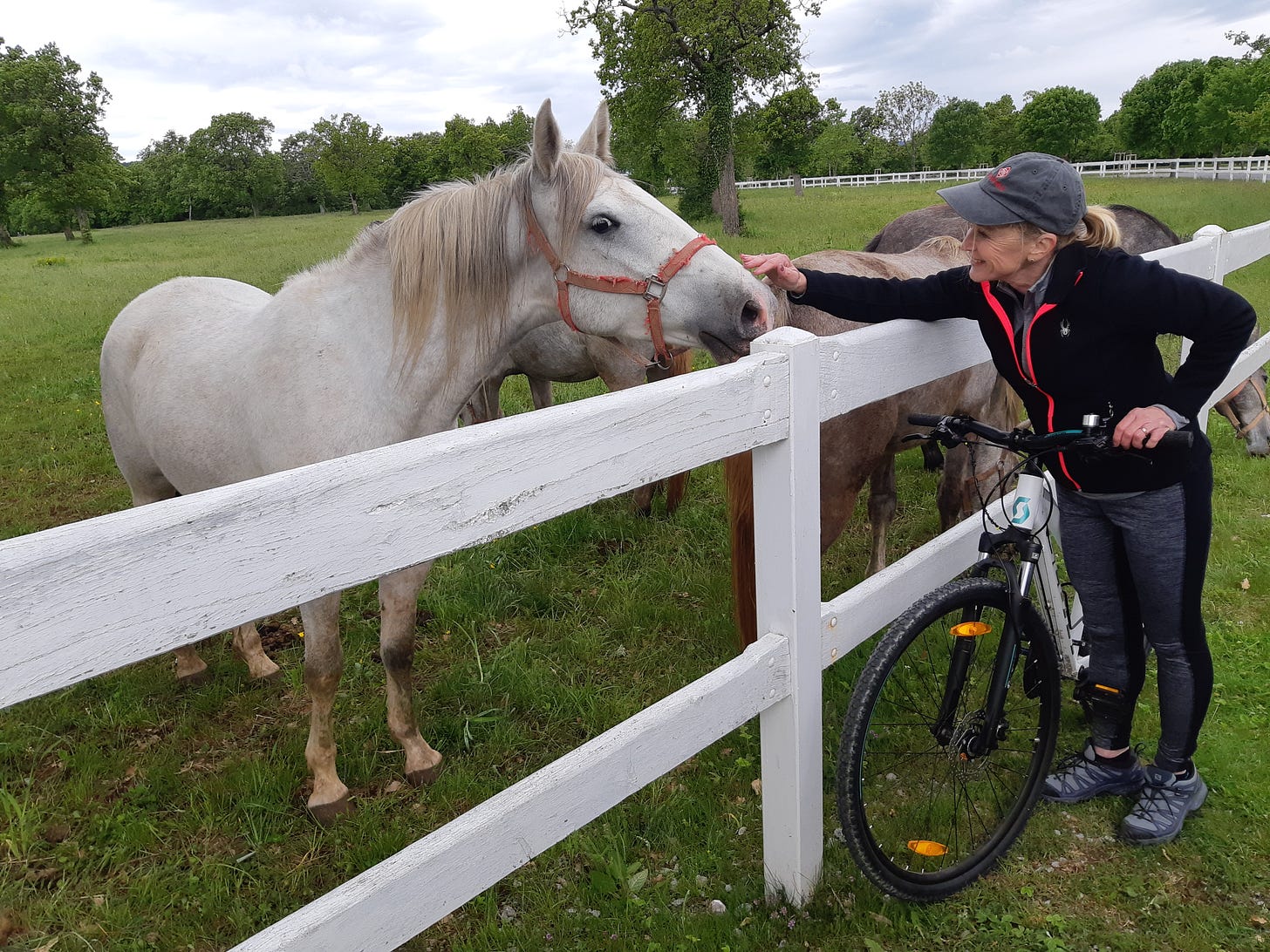How AI Wants To Change the Way You Travel
Spoiler Alert: It's Not Good.
When you are planning a trip, it’s nice to get FREE travel tips from real people. Not robots. Now that artificial intelligence is getting involved, it can be hard to tell the difference.
In this issue of the newsletter:
AI is on Trip Advisor. Can it really plan your trip?
AI is writing travel books. How much do they suck?
Where to find FREE or low cost travel info from REAL people.
In the News: Selfies kill more people than shark attacks.

Can AI really plan your trip?
Short answer: No. Not yet, anyway.
I asked Chat GPT to plan a three-day itinerary in a place I know very well: Ljubljana, the capital city of Slovenia. The results weren’t awful. It’s pretty hard to miss the castle overlooking the city, even if you’re a robot. But AI didn’t recommend whether you should take the funicular or walk. And Prešeren Square is not located in the Old Town.
AI advised having lunch at one of the charming cafes along the riverbank, although real Slovenians tend to just order drinks and snacks there. In the afternoon, stop at the cathedral and city hall before walking around huge Tivoli Park until it’s time to have dinner at another unnamed riverside restaurant. And then walk around the same place again after dark.

Apparently, Chat GPT was so unimpressed with Ljubljana that it recommends LEAVING on day two and taking a bus to Lake Bled. Lake Bled is a world-class beauty that should be a part of any trip to Slovenia. But AI missed a lot of essential things for a three-day Ljubljana city break, like taking a river boat ride or trying the popular Balkan food. And nothing on the UNESCO world heritage architecture of Jože Plečnik, except for a brief mention of the Triple Bridge. Fear not, you can get my Totally Honest Guide to Ljubljana here.
AI Trip Builder on Trip Advisor
Trip Advisor’s AI works a little bit differently. You input the destination, the month of your trip and the number of days. Specify if you’re traveling solo, with friends or with kids. Then make some choices like “great food” and “must-see attractions” or “hidden gems.” Is it just me or does EVERYONE want those things? If it’s a “bad food” tour with “don’t bother” attractions that are tourist traps, why even go?
For the Reykjavik, Iceland trip I’m planning in July, the bot served up three mid-priced hotels and even a vegan restaurant. (How did it know I’m vegetarian?) I was surprised when the famed Blue Lagoon didn’t make the list of must-see attractions, although I suppose I could have checked the thermal spas option. And it recommended an afternoon drive along the Ring Road. That’s equivalent to driving from Boston to North Carolina, an 825-mile trip around Iceland that typically takes a couple of weeks. Not too practical.
Don’t get me wrong, I believe in Trip Advisor and get a few cents commission when readers click on my blog links to book a hotel. But the whole point of Trip Advisor is REAL reviews from REAL travelers, not AI. Let’s be honest and say the bots are just combing through the real reviews to find the ones that mention the “hidden gems.” It’s like a kid copying the exam answers from the other students’ papers but hoping the teacher won’t notice that some of the responses are misleading or wrong.
AI is Writing Travel Books that Mostly Suck
A great way to get FREE travel advice from real people is to join Facebook groups about the destination. So, when I joined the Iceland Scandinavia Travel group, I was surprised to find a warning from Full Suitcase, the hardworking REAL blogger who moderates the discussion.
Warning - fake accounts advertising ‘travel guides’ you should buy on Amazon.
Definitely don’t waste your money on those AI-written books. These people never even set a foot in Iceland. They are clearly using AI to answer your questions to make it look like they know what they’re talking about.
I just deleted 18 comments from one person suggesting to everyone to get these books on Amazon. It’s sad but we can’t avoid them sneaking into our group.
Greetings from Nigeria
And if you ever wondered what happened to that Nigerian prince who needs your help to collect his multimillion dollar inheritance? Well, he might be selling AI travel books now.
One of them turned up on a Facebook group for travelers to the island of St. Lucia. A Facebook account from Port Harcourt Nigeria was answering travelers questions about hotels or car rentals by telling everyone to buy a book called “Saint Lucia Revealed.”
Of course, it is entirely possible that an awesome African traveler wrote a book about a Caribbean destination. I’d buy that book! But the Facebook account has only existed since the 117-page book was published on Amazon. It has only a single one-star rating, no reviews and no bio to suggest the author is a real person who has actually been to St. Lucia.
Buyer beware! Amazon isn’t policing this, so you’re on your own. As my son the writer has pointed out, the brave new world of Indie Publishing is open to fresh, diverse voices — but also crap. Anyone can ask AI to write a generic travel book about anywhere, generate a cover-image and publish the results next to the real guidebooks.

How AI Threatens Real Travel Writers
The upcoming TBEX conventions in Puerto Rico and San Sebastian, Spain will feature sessions on “the implications but also the implementation of AI in content creation and creator business management.” If that sounds like a quote from a marketing manager, it is. Translation: How you can use AI to improve your travel reporting so that you can compete with content that is created by AI.
A recent TBEX online workshop reached the conclusion that travelers will eventually be overwhelmed with machine-generated content that’s not very helpful — and then search for real advice from someone who has actually been somewhere, prioritizing keywords like “authentic” and “personal experience.”
Where to Find FREE Travel Advice from REAL Experts
Trusted guidebook brands: Publishers like Frommers, Rick Steves or Lonely Planet hire local experts to write their travel guides. Case in point: Lonely Planet’s new book on Caribbean Islands, with 22 pages on Guadeloupe by my friend Mirva Lempaiänen. She’s a globe-trotting journalist who wrote her own real book on “Gwada,” while raising her two adorable kids there. There are some good independently published guides, but check for a bio to make sure the author is a real person with some expertise.
Local experts on Facebook: As mentioned above, check out Facebook travel groups for the destination you want to visit. The good ones, like Slovenia Travel Forum, are run by experienced bloggers who live there and have thousands of members. There’s always a bit of self-promotion from people who have an apartment to rent or a tour package to sell. But they also answer your routine questions like, “What is the best way to get into the city from the airport?” (Hint: it is almost never a taxi.)

Book with local guides who live in the destination. This SloActive cycling tour of Slovenia’s karst region includes the itinerary and the bike. Real people make sure your luggage is waiting for you at the next cozy inn. A robot can’t do that! Also get free tips, free or low-cost tours and money-saving discount cards from the local tourism agency. You can usually find it online by searching for “Visit” and then the name of the city or country, for example Visit Iceland.
Book through your hotel. When I was teaching TV journalists in Vietnam I only had a few free days and no time to plan a solo trip. My hotel booked me on some great small group tours like this action-packed day in Ninh Binh. If the tours were bad, previous guests would have complained, so there’s an incentive for the hotel-recommended tours to deliver a consistently memorable experience.
Pro Tip: Even if you booked on Trip Advisor or Booking.com, search for the hotel’s official website to see what’s offered.
Bloggers with opinions and emotions: My brief experiment with AI trip planning showed that bots are good at serving up a partial to-do list, but suck at telling you if it’s worth your time and money. When I was a TV reporter I tried to get soundbites from people with opinions and emotions. When your online travel search leads you to a blog post, look for writers who have feelings about the place, plus personal photos of their experience. Beware of articles written by AI, which use stock photos or machine-generated images to make it seem like advice from a real traveler. Don’t fall for it.
Next month in the newsletter: A winter break in the Caribbean that doesn’t involve a cruise ship or a fancy resort. I used all of the above tips to plan my family’s scuba diving trip to St. Lucia.
In the News: Selfies are Deadlier than Sharks!
A 2022 study published in the Journal of Travel Medicine counted 379 selfie-related deaths in a 13 year period. Of those, 140 were tourists taking their final trip photo. About half the deaths were from falling, the rest mostly due to drowning or being run over in traffic. Average age of victims was 24, more women than men. During the same time frame there were only 90 fatal shark encounters.
You have been warned! Don’t forget that this monthly newsletter is free, straight to your inbox with no advertising and no robots. See you next month.



I’m just now finding this article (new to Substack!) but it was a great read. Many people talk about AI trip planning as if it is inevitable, like it’s something that travelers are craving. Yes, it’s convenient but as you discuss how can we expect something based entirely on scraping data to produce a compelling itinerary? I suspect the output of most of these queries will be no better than simply skimming the top few Google results today.
Thanks for a thorough and informative article. It's eye-opening what AI missed in major tourist destinations.